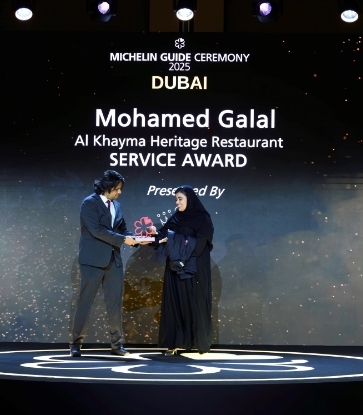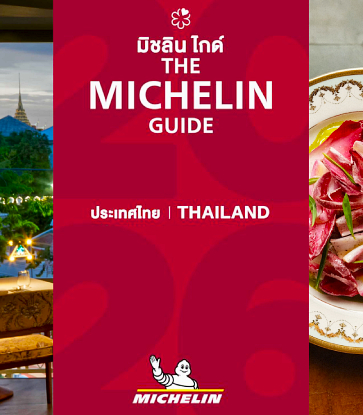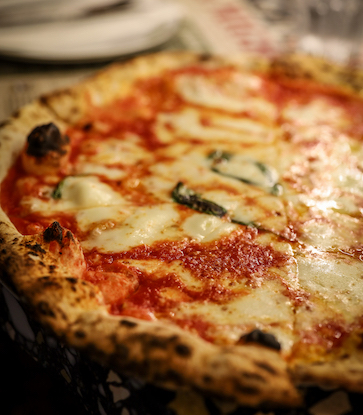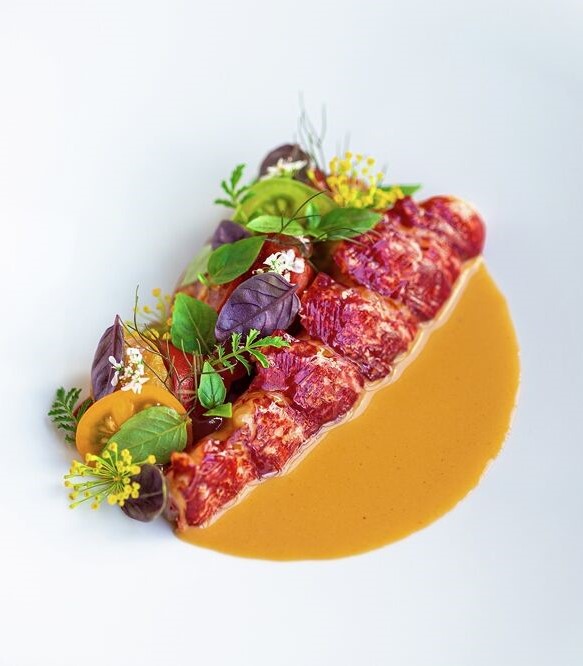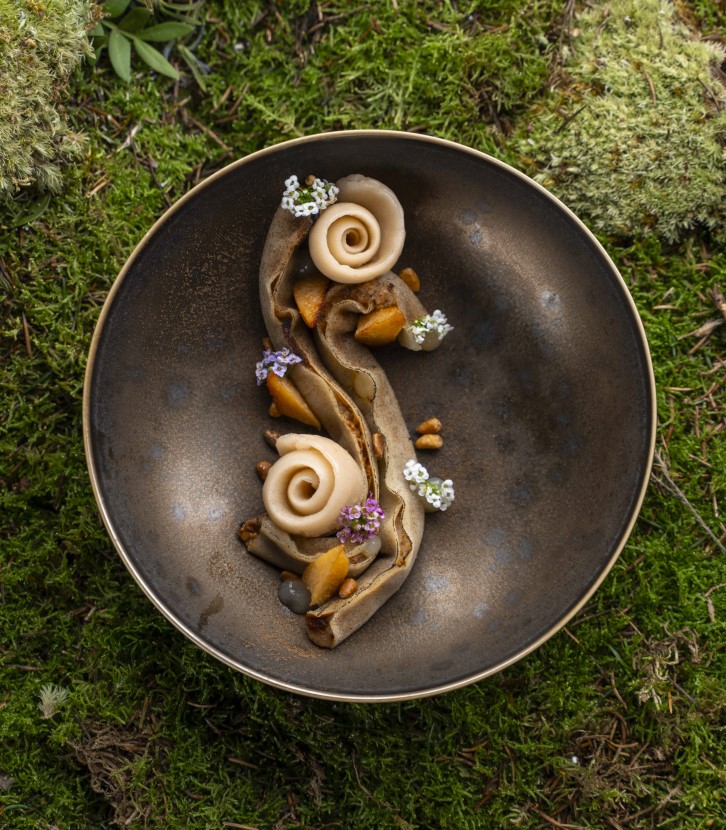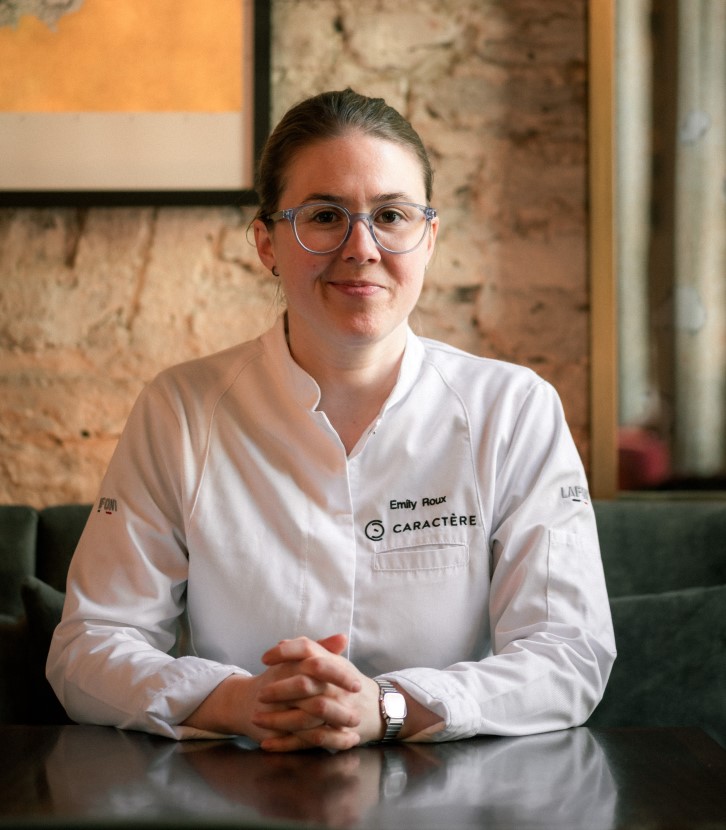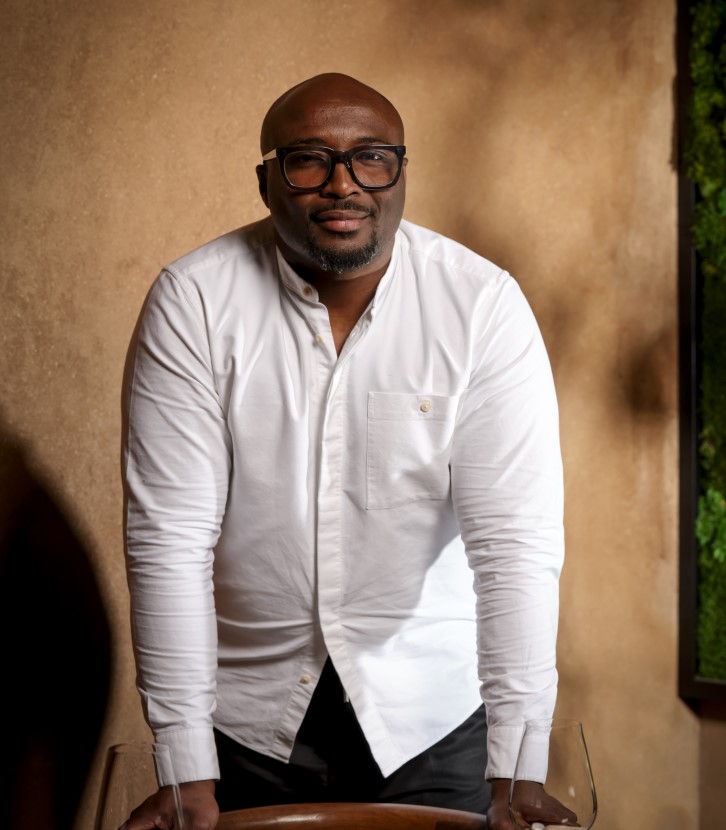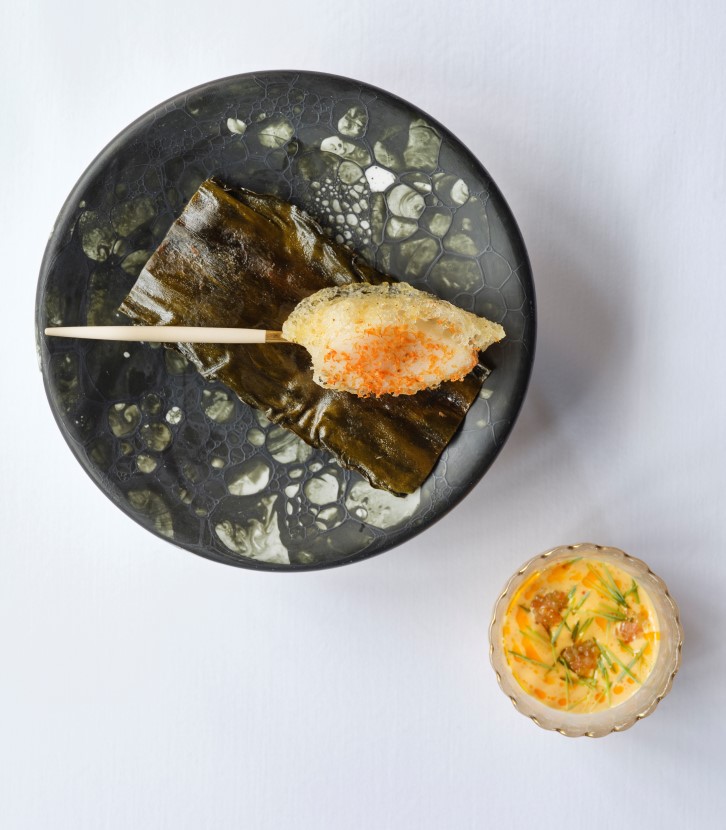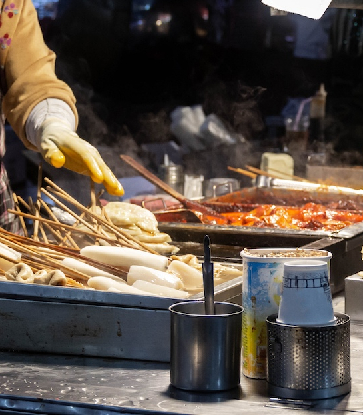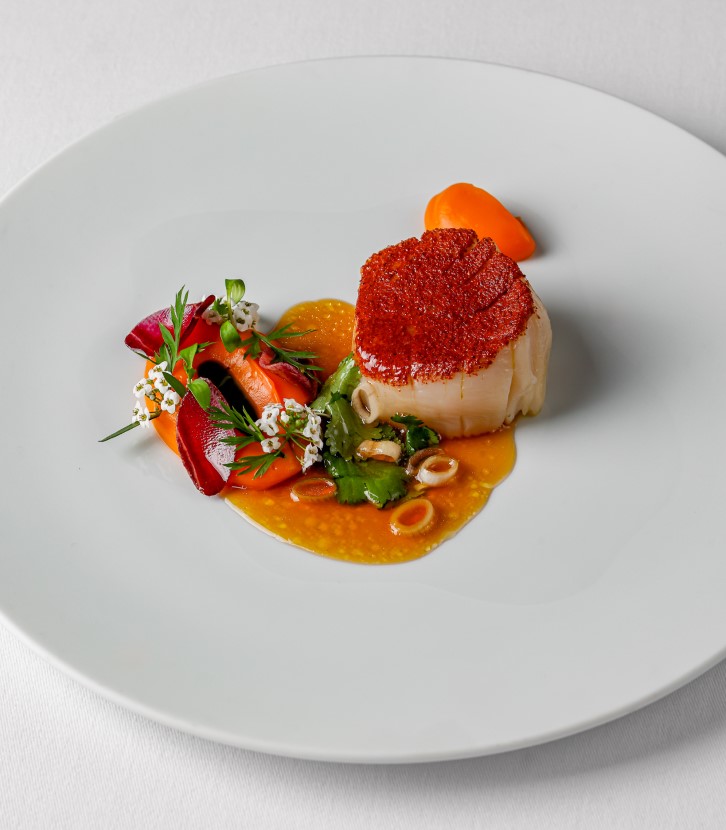In Singapore, a melting pot of culinary ambition fuelled strongly by the city's insatiable appetite for excellence, three restaurants stand at the summit, each bearing the MICHELIN Guide's highest honour, the industry’s ultimate nod that a restaurant has reached rarified heights — a place so exceptional, it’s worth crossing continents for: Three MICHELIN Stars.
There is Les Amis, helmed by Sébastien Lepinoy, known to be the Lion City's grande dame of luxurious French classics. Odette, under Julien Royer, boasts a "sense of place", weaving French gastronomy with whispers of Asian flavours. And then there’s Zén, Björn Frantzén’s Singapore outpost, where chefs T.C. Chua and Martin Öfner marry Scandinavian purity with Japanese finesse.
And so the question begs: "Three MICHELIN Stars... now what?" Three Stars, three philosophies, one relentless pursuit of something even greater. Let's hear it from the chefs.

Sébastien Lepinoy: A Master of Refinement in a World Obsessed with Expansion
Les Amis
For Sébastien Lepinoy, he views Les Amis's three MICHELIN Stars as a stabilising force in his career, allowing him to refine his craft rather than constantly chasing the next big thing. “Thomas Keller and Joël Robuchon were smart about their careers. I learned from them that it is better to focus on excellence than to chase money,” he shares. "I would rather do one thing perfectly than to spread myself too thinly.”
Perfection, of course, could be a slippery concept. Some chase it recklessly, burning out in the process. Lepinoy approaches it like a seasoned sculptor — chiseling away and stripping things down until only the essential remains.
The day-to-day operations of Les Amis begin and end with Lepinoy immersing himself in a myriad of tasks — from finances to financiers. "Running a 3-Star restaurant is not about pressure; rather, it's about responsibility," he shares. "Not only to my team, but also to our guests and to the standards I uphold for myself and my craft." Whether in ingredients or business decisions, maintaining high and absolute standards is the French chef's top priority. "If you want to keep the three MICHELIN Stars, you need to think long-term. We are constantly improving — not opening more restaurants, but making this one [Les Amis] better each day.”
“Earning MICHELIN Stars is not a competition. In a competition, you only need to be good for one day. Once your restaurant gets its Stars, you must be consistent — every single day.”
While Lepinoy’s philosophy is measured, thoughtful, and deeply committed to excellence — a refreshing contrast to the trend of rapid expansion, the topic of legacy is touched upon and his role as both a mentor and leader to his team.
"Legacy is all about the people. The act of training and mentoring chefs is more valuable than any single dish," he says. "In my current team, I have staff who've worked with me for 10, 12, 15 years. I'd like to believe that this is what creates a real legacy. For my chefs who have chosen to leave, I don’t just say goodbye. I help them find their next step. I will always want them to succeed.”
Looking into the future, Lepinoy ruminates, "À la carte is making a comeback. People want choice, not just tasting menus. The timing of things is so, so crucial to a restaurant's success, especially these days. It's not just about opening in the right place, it's also about opening at the right time." Although Lepinoy shares dreams of hopefully launching a small, high-quality bistro in Singapore one day, he says he has to park that aside for now despite having all plans fleshed out, simply because the time isn't ripe yet.

For Lepinoy, Les Amis's 3-Star achievement is not a signal to expand, but a call to refine and improve, in effect, deepening his craft rather than widening his reach. Overseeing a major kitchen renovation to ensure the restaurant remains at the cutting edge is one thing, while preserving his legacy through mentorship is another. Lepinoy views Les Amis's three MICHELIN Stars not as a finish line, but as a commitment to long-term excellence. As he puts it:
“The day your restaurant gets three MICHELIN Stars is the day a new journey begins. MICHELIN trusts you, but now, you must prove you can keep that trust.”

Julien Royer: In Pursuit of a "Fourth MICHELIN Star"
Odette
“The beauty of our job is that the more you know, the more you realise you know very little,” says Julien Royer of Odette.
For Royer, his obsession with the elusive art of making a meal unforgettable stems from his humble upbringing in Clermont-Ferrand in France, aptly where Michelin was founded, where he unknowingly ate like a king on the humblest of ingredients.
Now, helming one of Singapore’s most revered dining rooms, Royer has been a testament of what it means to exercise the type of responsibility that comes with excellence. Ever a student of life, every day to him is an education in leadership, hospitality, and new ways of cooking, to name a few.

"I was very lucky to grow up with great produce around me," shares Royer. "We didn't have much money growing up, but today, I realise that I was eating so luxuriously," he adds. Royer reflects on the significance of the MICHELIN Guide in his life, highlighting how food should be not only a source of nourishment, but also, of joy.
At Odette, Royer cooks with a "sense of place", balancing his French culinary roots and personal identity with an Asian context. Exercising an almost poetic reverence for produce, Royer weaves Asia into his plates as an homage, a way of ensuring that what lands on each guest’s plate feels like it belongs.
“You have to understand who you cook for — their habits, their culture, their history. Cooking is not just about making good food.”
Royer moves through Odette like a conductor, his energy infectious, his laugh echoing through the softly lit dining room. His belief? A restaurant isn’t just about the food — it’s about the people, the rhythm, and the invisible pulse that makes a place feel alive.
"Energy is everything," he says. "When you walk into a restaurant, you can feel it immediately, which is why it is so important for me to keep my team inspired and happy." According to him, integrity, humility, and passion are the values that drive everything they do at the restaurant, emphasising the quote "If you want to go fast, go alone. If you want to go far, go together" — an adage he learned during his early years of cooking.

Odette was awarded its third MICHELIN Star in 2019, and with a cookbook in the works and a restaurant refresh on the horizon, Royer is not just maintaining his restaurant's three MICHELIN Stars — he’s chasing something greater.
The "Fourth MICHELIN Star", as he calls it, isn’t an actual award but an idea, a personal philosophy. "To me, since the guests have travelled all the way to Odette, we must heighten their dining experience by creating timeless memories and emotional connections through the food we serve. After all, we don’t just cook; we create experiences that turn into memories.”
Royer emphasises that complacency is never an option as he continues to pursue excellence in his craft. "Odette is not just a restaurant," he says simply. "It’s a place where magic happens."
And for Royer, the real trick is making sure that magic never fades.

T.C. Chua and Martin Öfner: Two Chefs, Three Stars, and an Endless Pursuit of More
Zén
The Singaporean outpost of Björn Frantzén, a man who has built his reputation on pushing the limits of what fine dining can be, Zén is far from being a clone of its Stockholm sibling. It is a living, breathing entity of its own, shaped by the hands and minds of executive chefs T.C. Chua and Martin Öfner — two men who understand that three MICHELIN Stars are not only an accolade but also an expectation, a daily dare to be better than the night before.

Earning its third MICHELIN star in 2021 put Zén firmly in the upper echelons of global fine dining, and within its walls, both Chua and Öfner steer the ship under the guidance of Frantzén.
It’s an arrangement that, in the wrong hands, could be a disaster — as the saying goes, "too many cooks spoil the broth". But at Zén, it seems to work. Chua is the steady hand, the foundation, a quiet force ensuring every plate upholds the weight of the restaurant's three Stars; while Öfner is the restless innovator, the one who questions, refines, and reinvents. One builds structure; the other bends it just enough to keep things evolving.
Chua draws parallels to Kobe Bryant’s career, noting his early ambition refined into mature leadership. While he acknowledges the weight of expectations, he remains focused on ensuring guest satisfaction rather than chasing external validation.

"Guests visit Zén because it has been awarded three MICHELIN Stars, and so, they expect excellence. We need to be the best,” he says.
Chua, who says he started cooking not for the awards but simply to earn a living, now finds himself in a different place — one where three MICHELIN Stars aren’t the goal but the baseline. "I didn’t start cooking for awards — I started to earn a living and learn the craft," he admits.
Eventually, it felt like life was urging him to move beyond his comfort zone of always being agreeable.
“I started to aim for 3 Stars as I am quite ambitious as a person. But now, it's about training the next generation for me.”

Öfner, on the other hand, embraces continuous learning, knowing that confidence must be paired with curiosity.
While acknowledging the weight of the recognition, he has his heart set on pushing the boundaries of hospitality and deepening his understanding of flavours and tradition.
“The expectation is higher, and so is the challenge to keep evolving,” he says. "For me, it's about growth — not necessarily in size, but in depth, as well as longevity — ensuring that the philosophy and culture we’ve built is sustained for years to come.”
“The confidence has grown, but so has the awareness of how much there still is to learn.”
With Zén setting the standard for hospitality and cutting edge cuisine with its three MICHELIN Stars, Chua expresses that the journey doesn't end there. To him, it’s about consistency, refinement, and preparing for even greater achievements in the future. As he puts it: “Attaining three MICHELIN Stars has never been the primary objective. My foremost priority is ensuring that our guests have an exceptional experience.”
In Öfner's opinion, three MICHELIN Stars come with pride, responsibility, and gratitude — but the real work is in progress over perfection: continuing to refine, innovate, and ensure that every guest experience becomes even more special. “Perfection is never the goal — progress is. Running a three-MICHELIN-Starred restaurant is a challenge to keep evolving.”
If Chua keeps the ship steady, Öfner makes sure it never stops moving. In an industry where the cult of the singular chef reigns supreme, Zén proves that sometimes, two heads might just be better than one.
Being awarded three MICHELIN Stars is often described as the ultimate culinary achievement, an affirmation that a restaurant offers "exceptional cuisine that is worth a special journey". In an industry where there is a palpable obsession directed towards gastronomic perfection, where a fanatical devotion to detail is exercised, and where long nights may be spent dissecting a single sauce, the weight of the Stars hang heavy, extending beyond gleaming plaques on the wall.
Perhaps, it's not always about the applause. Maybe, it's about that quiet satisfaction, knowing that for a sole and fleeting moment, a single bite was crafted precisely and exactly as it was intended. And that, ultimately, might be something worth crossing continents for.





